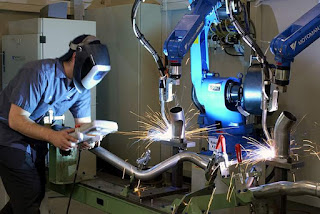Introduction
With today's advances in technology, many companies are starting to implement processes involving robots and advanced machines. Many people believe it is at the expense of many workers jobs. This ethical dilemma between automation and human interaction has been ongoing for the last couple decades.Automation
The use of automation in the manufacturing industry has heavily impacted the productivity of some facilities. RobotWorx is a company that manufactures automated industrial robots, and explains the many benefits of these machines. There is an astounding variety of different uses for robots includingwelding, material handling, packing, palletizing, dispensing, and cutting for examples.
The benefits for automation seem to add up considerably from a manufacturer's stand point.
- Reduce Production Cost- The quick return on investment overcome the cost of initial setup.
- Decrease in Part Cycle Time- Robots can work longer and faster to increase production rate, this is especially important for facilities practicing Lean Manufacturing.
- Improved Quality and Reliability- Automation is precise and repeatable. This ensures the product is manufactured with the same specifications and process everytime
- Better Floor Utilization- By decreasing a footprint in a work area by automating parts of your production line, you can utilize the floor space for other operations and make the process flow more efficient.
- Reduce Waste- Robots are so accurate that the amount of raw material used can be reduced, decreasing costs on waste.
- Saves Local Jobs- Instead of moving your company to a location with lower labor costs, incorporate automation in a few key areas. This will increase your product through-put and increase your profit so you can keep your company in the current location.
- Stay Competitive- Reduction in schedule and cost attracts customers. Automation helps provide the highest throughput with least amount of spending.

Hired Workers
 Humans can be as reliable, but unfortunately not as efficient as robots. Robots still have problems, which does mean down time and decreases in profit. These workers would be able to keep
Humans can be as reliable, but unfortunately not as efficient as robots. Robots still have problems, which does mean down time and decreases in profit. These workers would be able to keep working when a robot would be down and needs repairing. Retaining jobs for humans gives not only a good image for a company, but gives jobs to many people. This helps stimulate the community the factory is located in with other jobs to fill the needs of the workers. One of the many things that comes from having actual human workers is a strong relationship with those people and the community. This is better than the unemployment state that some workers might find themselves in.
My View
 |
| Programmer Working With Robot |
No comments:
Post a Comment